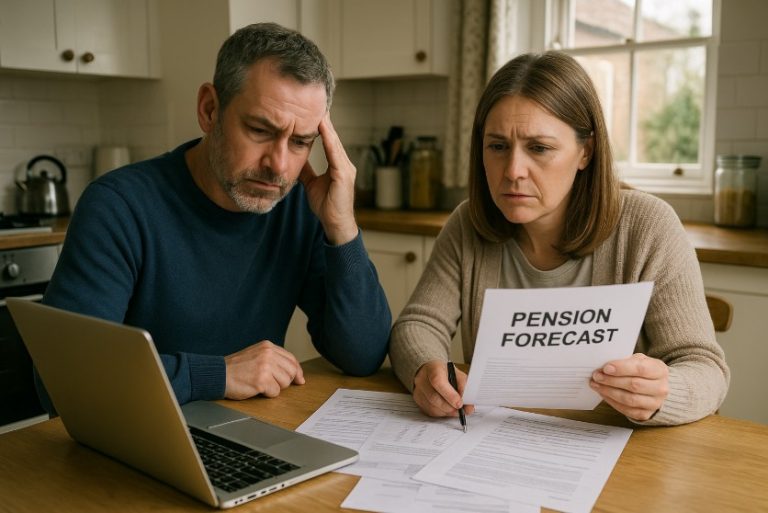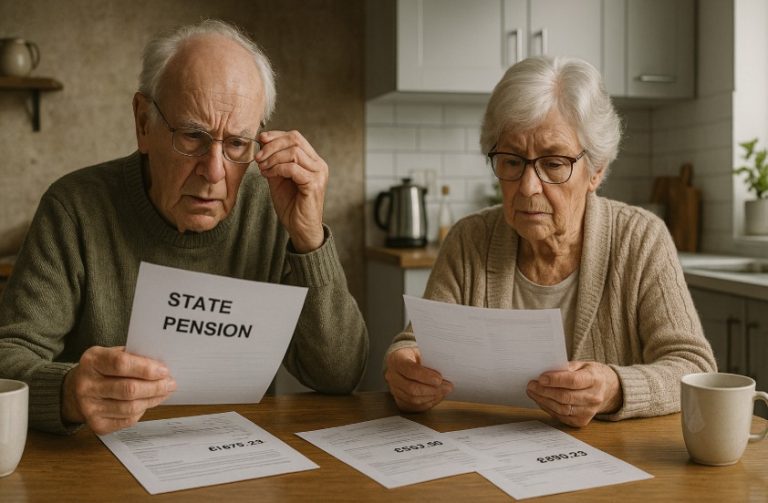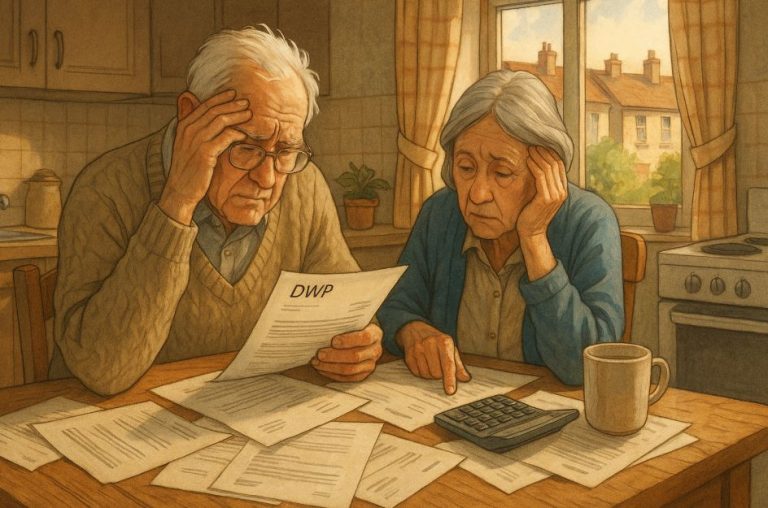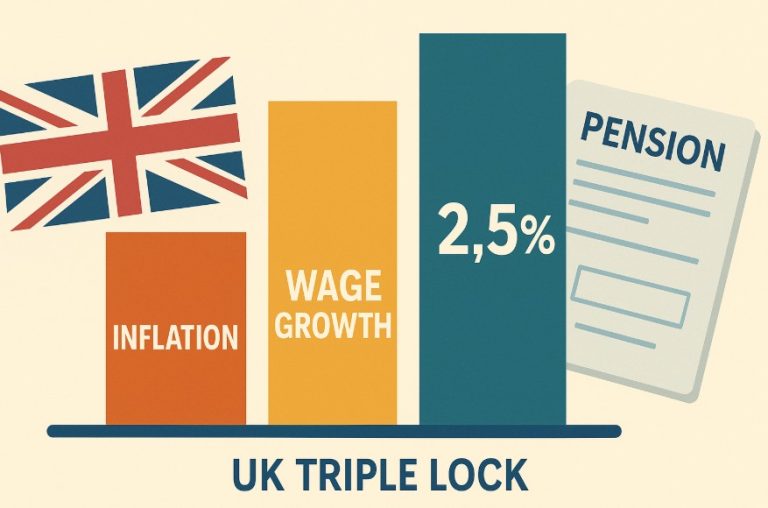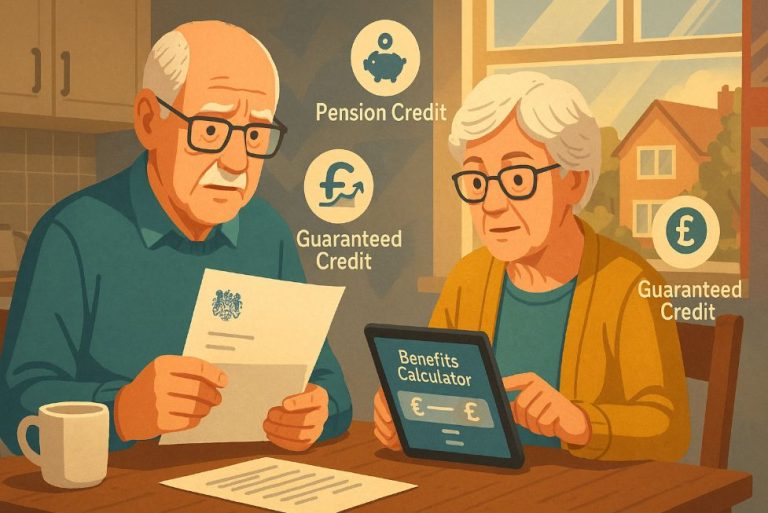Thousands of UK pensioners are unexpectedly facing steep tax bills after withdrawing funds from their retirement savings, only to discover they’ve been overcharged by HMRC.
This growing issue stems from the use of emergency tax codes applied to one-off pension withdrawals, often resulting in significant upfront deductions.
As a result, many retirees are now navigating a lengthy refund process to reclaim their money. With refund claims on the rise, understanding how and why this happens has never been more important.
Why Are Thousands of Pensioners Receiving Tax Refunds from HMRC?
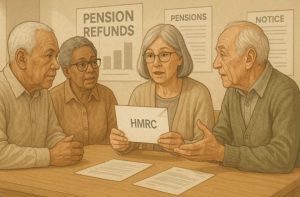
In the 2023/24 tax year, nearly 60,000 pensioners across the UK reclaimed overpaid tax from HMRC following unexpected charges on their pension withdrawals.
This reflects a 20% increase in refund claims compared to the previous year. The core reason for this rise is HMRC’s method of applying emergency tax codes when pension withdrawals are made, particularly large lump sums.
When pension freedoms were introduced in 2015, individuals over 55 gained more control over how and when to access their retirement savings.
While this policy offered flexibility, it also created a complex taxation environment. Since then, HMRC has refunded more than £1.4 billion in overpaid tax to pensioners who were initially charged excessive amounts.
A significant proportion of these claims come from those making one-off withdrawals from their pension pots. Due to HMRC treating these as regular income, many retirees have had thousands deducted unfairly, only to reclaim the funds later.
What Is the Emergency Tax Code and How Does It Work?
The emergency tax code is a temporary tax calculation used by HMRC when there isn’t sufficient information about a taxpayer’s income.
When a pension provider doesn’t hold a tax code for a retiree, the system automatically assumes the withdrawal is a monthly income. The emergency code applied is typically a Month 1 code, which treats the income as though it will repeat every month for the rest of the year.
This often results in excessive deductions at the point of withdrawal. For example, a one-off pension drawdown of £30,000 may be taxed as if the individual is receiving £30,000 every month for the rest of the year. This artificial inflation of income triggers a higher tax band and leads to a significant overpayment.
How Much Money Are Pensioners Reclaiming from HMRC?
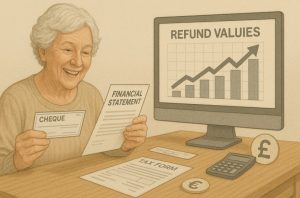
Recent tax data from HMRC reveals a significant spike in the number and value of tax refunds issued to pensioners who were overcharged following lump-sum withdrawals.
The emergency tax system has resulted in many retirees being taxed as though they were earning monthly income at a high rate, rather than drawing down a one-off amount.
Refund Volumes Continue to Rise Year on Year
The volume of claims filed by pensioners has increased steadily since pension freedoms were introduced in 2015. In the 2023/24 tax year, around 60,000 individuals filed successful claims to recover overpaid tax.
This marked a 20% increase compared to the previous year, reflecting greater public awareness and possibly larger pension withdrawals being made in anticipation of upcoming inheritance tax changes.
Average Refund Amounts Are Increasing
One of the most telling figures is the rise in the average refund amount. In 2022/23, the typical refund was £3,062. This rose to £3,342 in 2023/24 an increase of £280 or roughly 9%.
This trend suggests that pensioners are withdrawing larger sums and, in turn, facing higher emergency tax deductions upfront.
Significant Refunds for Thousands
While many refunds are in the low thousands, a growing number of pensioners are recovering substantial sums. In the most recent tax year:
- Over 11,700 pensioners received refunds of £5,000 or more
- 2,400 claimants reclaimed over £10,000
- The top 25 refund cases averaged £106,900 per person
This data illustrates that the issue is not limited to minor accounting errors in some cases, retirees are overcharged by tens of thousands of pounds.
Pension Refunds by Category and Amount
| Refund Category | Number of Pensioners | Average Refund Value |
| Total Refund Claims (2023/24) | 60,000 | £3,342 |
| Refunds over £5,000 | 11,700 | £6,100 (approx.) |
| Refunds over £10,000 | 2,400 | £11,800 (approx.) |
| Top 25 Refunds | 25 | £106,900 |
| Total Refunds Since 2015 | N/A | £1.4 Billion (cumulative) |
These figures underscore the scale of the problem and the urgent need for more accurate tax application at the point of withdrawal.
Who Has Been Most Affected by These Emergency Tax Charges?
The individuals most affected by emergency pension taxation are those making one-off or irregular withdrawals from their defined contribution pension pots.
These pensioners often lack other significant income and are relying on their retirement savings to cover essential or planned expenses.
Retirees Accessing Pension Funds for the First Time
The emergency tax system most often impacts those making their first-ever pension withdrawal. Without an established tax code or payroll record, HMRC defaults to a generic tax code, frequently resulting in excessive deductions.
Those Making Large Lump-Sum Withdrawals
Retirees withdrawing large amounts in a single transaction face the greatest financial penalties under the emergency tax model. These lump sums are typically intended for:
- Paying off mortgages or outstanding debts
- Assisting family members with property purchases or education costs
- Funding critical healthcare or long-term care
- Gifting assets before inheritance tax changes take effect
These pensioners are especially vulnerable because their withdrawals are irregular and usually unanticipated by HMRC, making them prime candidates for emergency taxation.
Middle-Income Pensioners Without Financial Advice
Many affected pensioners fall into the middle-income bracket and are unaware of how tax codes apply to pension drawdowns.
Without the support of financial advisers, they may not realise they have overpaid tax until much later. This can delay their ability to reclaim funds and may result in unnecessary financial strain during retirement.
Can You Claim a Tax Refund If You’ve Been Overcharged?

Yes, HMRC has provisions in place for pensioners to reclaim overpaid tax. Individuals can use one of three forms depending on the type of withdrawal and income situation:
- P55: For partial pension withdrawals where the person is not receiving regular payments
- P53Z: For full pension withdrawals with other sources of income
- P50Z: For full withdrawals with no additional income
Claiming a refund online typically results in a repayment within 30 working days. If no claim is made, HMRC processes the refund after the end of the tax year. However, this may result in waiting several months before receiving the money.
HMRC Refund Claim Process Table
| Form Type | Use Case | Refund Time (Est.) |
| P55 | Partial withdrawal, no regular payments | Around 30 working days |
| P53Z | Full withdrawal, other taxable income present | Around 30 working days |
| P50Z | Full withdrawal, no other income | Around 30 working days |
| Auto Refund | No form submitted, automatic end-of-year process | End of tax year or later |
Are There Any Changes Coming to the HMRC Refund Process?
In response to criticism and growing media attention, HMRC has acknowledged the issue and promised changes to the speed at which refunds are processed. Improvements include:
- Faster digital processing of forms
- Improved communication about applied tax codes
- Clarity in pension providers’ reporting procedures
Despite these improvements, the root problem persists. The emergency tax code will still apply in the absence of accurate, up-to-date tax data.
These tax codes are generated as a precaution and will continue to be used unless HMRC can align data more effectively with pension providers in real time.
Experts argue that changes need to go further. Without reforming the initial taxation method, faster refunds offer only temporary relief. Many continue to argue for a complete review of how emergency tax is calculated on pension withdrawals.
How Could Inheritance Tax Changes Affect Pension Withdrawals?
One of the significant drivers behind large pension withdrawals in recent months has been the forthcoming changes to inheritance tax.
Starting in April 2027, unused defined contribution pension funds may be subject to inheritance tax, depending on how they are passed on.
Currently, pensions can be passed to beneficiaries without inheritance tax if the pension holder dies before the age of 75. From 2027, however, this exemption may no longer apply, encouraging many retirees to take action now.
As a result, retirees are making:
- Larger withdrawals while still alive to make lifetime gifts
- Strategic drawdowns to pass wealth tax-efficiently
- Adjustments in estate planning to reduce IHT exposure
This increase in lump-sum withdrawals is projected to cause a further spike in emergency tax incidents. HMRC systems, which are not designed to handle this volume of irregular large transactions, will likely continue to overtax pensioners at the point of withdrawal.
What Should Pensioners Do to Avoid Emergency Tax in the Future?
While emergency tax cannot be entirely avoided in all scenarios, there are practical steps pensioners can take to reduce the risk of overpayment:
- Spread withdrawals across the year rather than taking a single lump sum
- Request a personalised tax code from HMRC before accessing pension funds
- Monitor pension statements and act quickly if the wrong tax code is applied
- Consult with a financial adviser to optimise withdrawal strategy
Financial experts suggest that better preparation can help reduce the scale of overcharging. However, for many retirees without financial support, the system remains challenging to navigate.
Is the Emergency Tax System Fit for Purpose?
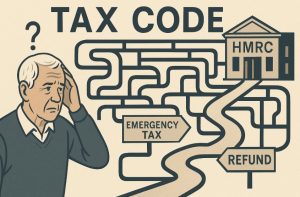
The current system of applying emergency tax codes has increasingly been called into question. While it may prevent under-taxation, it places a disproportionate burden on retirees to recover their own money.
The system assumes the pensioner can navigate tax forms, understand HMRC procedures, and handle the financial gap until the refund is processed.
Experts like Clare Moffat from Royal London argue that the fundamental issue is not just refund speed but the structure of the emergency tax system itself.
The assumption that every large pension withdrawal is part of a recurring income stream is outdated and fails to reflect the flexible nature of modern retirement planning.
The continued reliance on this system, especially in the face of changing inheritance rules and increased pension drawdowns, suggests that without reform, the number of pensioners affected will only grow.
Conclusion
With inheritance tax changes looming and pension withdrawal patterns shifting, emergency tax overpayments are likely to become even more frequent.
While HMRC is refunding thousands of pensioners who were overcharged tax on pension withdrawals, the underlying issue remains unresolved.
Greater awareness, smarter financial planning, and ongoing pressure for reform are essential to ensure pensioners can access their hard-earned savings without unnecessary financial hurdles.
Frequently Asked Questions
How long does it take to get a tax refund from HMRC for pension overpayments?
Most refunds are processed within 30 working days if the correct form is submitted. If left unclaimed, the refund is usually processed after the tax year ends.
What forms do I need to claim a refund on overpaid pension tax?
You’ll need either form P55, P53Z or P50Z depending on whether you’ve accessed part or all of your pension and whether you have other income sources.
Can I avoid emergency tax when taking money from my pension?
It’s difficult to completely avoid, but taking smaller withdrawals, informing HMRC in advance, or ensuring your tax code is up to date may help.
Why does HMRC treat pension withdrawals as monthly income?
The emergency tax code assumes regular income due to lack of payroll data. Until HMRC receives accurate figures, it uses this estimate to prevent under-taxation.
Is it better to take pension lump sums over time or all at once?
From a tax efficiency perspective, spreading withdrawals over time is often more beneficial, reducing the risk of being pushed into a higher tax band.
Will emergency tax apply every time I withdraw from my pension?
Usually, it applies only to the first withdrawal in a tax year if HMRC doesn’t have your tax details. Once your code is updated, subsequent withdrawals are taxed more accurately.
How are the new inheritance tax rules linked to pension withdrawals?
From 2027, unused pension funds may face IHT. This could lead to more people withdrawing early to gift money, increasing emergency tax incidents.

